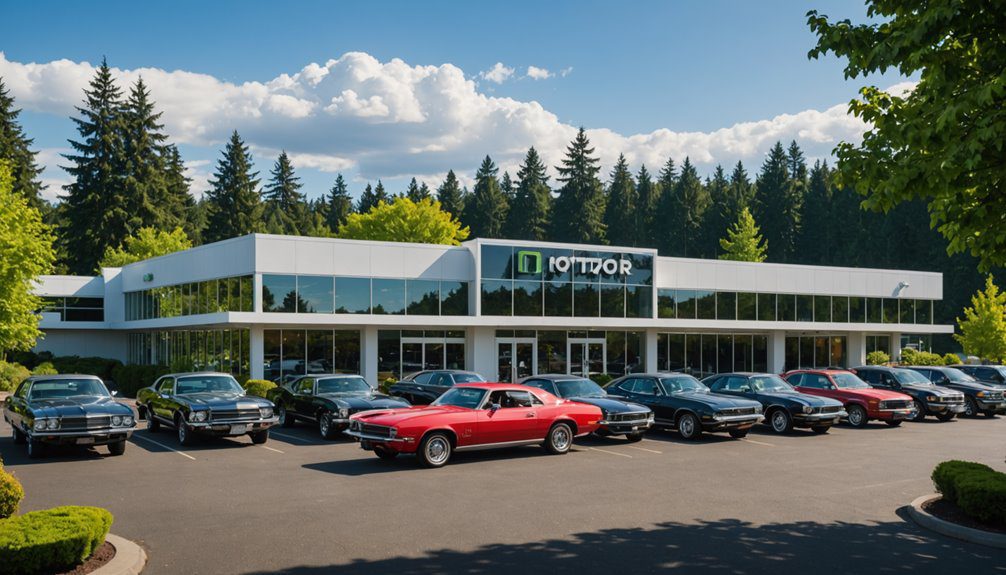When you're stepping into the world of motor vehicle dealerships in Oregon, understanding the $40,000 Motor Vehicle Dealer Bond is essential. This bond not only protects consumers but also bolsters your credibility in a competitive market. You might wonder what the specific requirements are and how you can secure this bond to ensure compliance with state regulations. As you navigate the process, you'll find that maintaining your bond can impact your dealership's reputation significantly. So, what steps do you need to take to get started?
What Is a Motor Vehicle Dealer Bond?

A motor vehicle dealer bond is a type of surety bond that protects consumers and ensures compliance with state regulations. If you're a dealership owner in Oregon, you'll need this bond to operate legally. The bond acts as a financial guarantee that you'll adhere to the laws governing vehicle sales and dealership practices.
Essentially, it's a contract among three parties: you (the dealer), the state, and the bond company. If you fail to comply with regulations or if a consumer suffers a loss due to your actions, the bond provides financial compensation to the affected party. This mechanism not only safeguards consumers but also enhances your credibility as a dealer.
You're required to obtain a bond for a specific amount—in Oregon, it's typically $40,000. The cost of the bond is a fraction of this amount, usually determined by your credit score and business history. Additionally, these bonds serve as a financial protection for consumers against potential dealer fraud and negligence.
Why You Need the Bond
Obtaining a motor vehicle dealer bond isn't just a legal requirement; it's a vital step for your dealership's success. This bond helps establish your credibility in the industry, signaling to customers and suppliers that you're committed to ethical business practices.
Without it, you might struggle to gain trust from potential buyers, affecting your sales and reputation.
Additionally, the bond acts as a safety net for your customers. If they experience any issues related to your dealership, such as fraud or failure to deliver a purchased vehicle, they can file a claim against the bond. This means you're held accountable for your actions, which encourages you to maintain high standards in your business dealings.
Moreover, having a dealer bond can open doors for financing and partnerships. Many lenders and suppliers require it as part of their risk assessment, so having a bond in place can help secure better terms for your dealership. Maintaining compliance with bonding requirements fosters industry integrity and accountability, acting as a deterrent against unethical practices in the auto dealership sector.
Bond Amount and Requirements

Determining the bond amount and requirements for your Oregon motor vehicle dealership is crucial for compliance and success. In Oregon, the required bond amount is set at $40,000. This bond acts as a financial guarantee that you'll adhere to state regulations and ethical business practices.
To obtain this bond, you'll need to meet certain qualifications. Typically, you must provide personal and business financial information, including your credit history. Insurers will evaluate your creditworthiness, as a stronger credit score can lead to lower premium rates.
It's also essential to gather documentation related to your business operations, such as your dealership's licensing information and any relevant business licenses. This documentation helps demonstrate your legitimacy and commitment to following state laws.
Bear in mind that the bond isn't a one-time requirement; you'll need to renew it periodically to maintain your dealership's license. Staying informed about any changes in bond requirements or regulations is vital. Additionally, understanding the performance bonds can further enhance your dealership's credibility and compliance with state laws.
How to Obtain the Bond
Securing your Oregon motor vehicle dealer bond involves a straightforward process that can be completed with the right preparation.
First, you'll need to gather essential documents, including your dealer license application and any other paperwork required by the Oregon Department of Transportation. Having these ready will streamline your application process.
Next, you should research and choose a reputable surety bond provider. It's crucial to compare quotes from multiple companies to ensure you get the best rate.
Once you've selected a provider, fill out their application form, providing accurate information about your business and financial background.
After submitting your application, the surety company will review your creditworthiness and may request additional documentation. If everything checks out, you'll receive a bond quote.
Review the terms carefully before signing. Once you agree to the terms and pay the premium, the surety will issue your bond.
Remember to keep a copy for your records. Finally, submit your bond to the appropriate state agency to complete the process.
With these steps, you'll be well on your way to obtaining your Oregon motor vehicle dealer bond, as license and permit bonds ensure compliance with laws and regulations for licensed businesses.
Maintaining Your Bond Compliance

Staying on top of your bond compliance is essential for maintaining your motor vehicle dealer license in Oregon. To ensure you meet all requirements, regularly review the terms of your bond and stay informed about any changes in state regulations. One key aspect is keeping your bond amount current; for motor vehicle dealers, this is typically set at $40,000.
You'll also want to avoid any actions that could lead to claims against your bond, such as failing to follow state laws or customer complaints. Promptly address any issues that arise, as they could jeopardize your bond status. If a claim is filed, you'll need to resolve it quickly, as unresolved claims can lead to cancellation of your bond and loss of your dealer license.
Maintaining open communication with your bonding company is crucial. They can provide guidance on compliance and notify you of any upcoming renewals or adjustments. Insurance broker bonds serve as a financial guarantee for compliance with laws and regulations, reinforcing the importance of maintaining your bond.
Remember that keeping your bond active isn't just about legal compliance; it's also about building trust with your customers, ensuring your business thrives in the competitive market. By staying proactive, you can keep your dealership running smoothly and your bond in good standing.
Conclusion
In summary, the Oregon Motor Vehicle Dealer Bond is essential for establishing trust and compliance in the dealership industry. By securing this $40,000 bond, you not only protect consumers but also enhance your business reputation and foster valuable partnerships. Remember to keep your bond current and address any customer complaints promptly to maintain compliance. With the right steps, you'll position your dealership for success and build lasting relationships with both buyers and suppliers.


